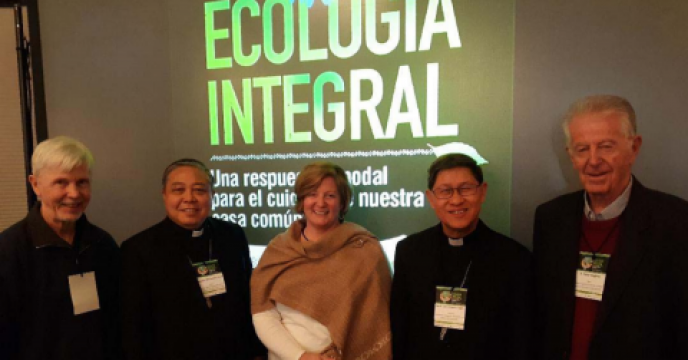There is a worldwide movement underway, an awakening at last to the seriousness of the environmental crisis at hand. The future of the planet and humanity depends on it.
It was through my association with the Columban Sisters that I began to learn just how crucial the Subanen culture is as a voice on behalf of a renewable Earth. The Subanens regarded their habitat as a sacred community to be cherished, not as a collection of resources to be exploited.
A new spirituality of creation is emerging, one deeply tied to the fate of the Earth. The stakes – the fate of the Earth and future generations – are high. Indigenous communities and women play a crucial role. The spirituality of creative nonviolence is deeper and more holistic, rooted in the gift of creation.
We are called to listen to the testimony of our sisters and brothers in the Philippines and Fiji by addressing climate change and reducing our contribution to extreme weather events and the rising sea levels which destroy their lives and devastate their island nations.
We have spent the last 200 years or so trying to deny the shadow side of our birth as a nation. Coming to terms with this history is vital for the future not only of indigenous people but of us non-aboriginal people as well.

Columban representatives Scott Wright (left), Peter Hughes (right) and Amy Echeverria (center) at the Pre-Synod Conference on the Amazon at Georgetown University with Archbishop Bernardito Auza and Luis Cardinal Tagle, from Manila.
We all have moments in our lives, like my daughter’s birth, when we feel both the immensity and intimacy of life tightly wound together. The Synod on the Amazon is one of those moments in the life of the Church – a moment when the Church, the people of God, and all of Creation are totally universal and utterly unique at the same time.
"The Story of Climate Change" is a free resource that documents how climate change impacts vulnerable communities around the world, and what you can do to stand in solidarity with those communities.
At first blush, environmental justice may sound nonessential to a life of faith. Many Catholics aren’t exposed to spiritual reflections on God’s creation or questions of environmental care at mass or during formation programs like confirmation or RCIA. But this shouldn't be the case.
We must respect indigenous communities as the protagonists of their own destinies. In many cases, they've already developed solutions to the problems they face, and their challenge implementing these solutions is that they don't have the cooperation of governments, corporations, and other power-brokers. As citizens and consumers, we have a responsibility to hold these institutions accountable.
Much comes back to reviewing consumption beyond Earth's finite resources, challenging the commodification of life, alongside practical initiatives to get back to working with life systems and not against them. It is a commitment to hand on to future generations of human beings the beauty and abundance that is God's gift to us. And future generations are demanding now that their rights are recognised.
Copyright © 2025 Columban Center for Advocacy and Outreach, Washington, D.C.